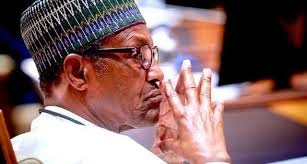
Four persons have been held responsible for bringing hardship on Nigerians due to the ongoing fuel scarcity and high cost of living.
In this interesting piece, four top officials have been identified as those who failed Nigeria and Nigerians concerning this crisis.
Read below:
For weeks, Nigerians have faced the worst petrol crisis the country has seen in at least a year.
Filling stations across the country have either closed or have been operating intermittent schedules that leave very long queues permanently at their gates. With the country’s erratic electricity supply, many businesses depend on petrol to be able to open their doors to their customers.
Forced to buy the product from the “black market”, the crisis has left a hole in the pockets of citizens at a time Nigerians are also groaning under a rising inflation that has pushed up prices of every commodity. The government has failed to see through its repeated promises to end the crisis after many weeks.
The recent scarcity, as it has now been explained by the federal government, was as a result of an off-spec product imported into the country. The off-spec petrol has further compounded the woes of Nigerians as the product has been reportedly damaging vehicles and generating sets.
Nigeria does not have a refinery that can match its local demand. The country averages a crude production of 1.6 million barrels per day.
The scarcity elicited a blame game. Although the Nigerian National Petroleum Corporation (NNPC) is mainly in charge of importing petrol, it blamed five other oil companies for the off-spec product.
The names of MRS, Emadeb, Brittania-U, Oando and Duke Oil came up when the discussion on the debacle was at its peak.
But who is really at fault? Nigerians hold four top officials of the government responsible for the fuel fiasco.
Muhammadu Buhari;
President Muhammadu Buhari, who doubles as the minister of petroleum resources, is responsible for every decision and policy related to Nigeria’s petroleum industry, including the upstream, midstream and downstream. Refining, importation, distribution and sales of petrol are upstream and midstream operations, and the petroleum minister oversees these activities.
Before assuming office in 2015, Mr Buhari and the All Progressives Congress (APC), his party, promised to revamp the refineries but after more than seven years, Nigeria continues to import petrol to meet its local need.
If the refineries were working, a portion of the country’s local demand could have been met locally.
Petrol scarcity was frequent under the administration of former President Goodluck Jonathan – a problem the APC latched upon to campaign in the build-up to the 2015 elections.
Interestingly, Nigeria is the only OPEC+ country importing petrol.
The president, who should take full responsibility for the scarcity and off-spec product, and work towards the speedy resolution of the problem, simply ordered an investigation – and weeks after nothing has been heard about the probe.
Mr Buhari is currently in the UK on a medical trip.
Timipre Sylva;
In an event the substantive minister fails to perform his functions, the minister of state for petroleum resources is expected to provide a stand-in support on all operational directions of the ministry. As such, Timipre Sylva, is expected to proffer solutions that could be adopted by the president.
Mr Sylva said the scarcity was an accident that was not foreseen, and that the problem would be solved in a few days.
Sylva;
“You will agree with me that these are conversations as far as fuel supply is concerned, but of course, accidents do happen,” he was quoted by Nairametrics as saying. “This is one of those accidents that was not foreseen, but I am quite happy to hear from the GMD and the authority chief executive all that they are doing to ensure that this problem is brought under control.
“From what they have told me, I believe that in a matter of days, we will be back to normal. Everybody is putting every effort to ensure that the supply disruption is solved.”
The government has given the same assurances for weeks without solving the problem.
Mele Kyari;
Mele Kyari, NNPC group managing, said quality inspectors tested the off-spec petrol but did not check the percentage of methanol, an additive.
Analysts have wondered why the country would be importing fuel without thorough checks.
Mr Kyari has repeatedly promised to end the scarcity and the queues but this is yet to be achieved.
Representatives Committee on Petroleum, the NNPC boss assured of enough supply that will reduce the queue within days.
“NNPC Ltd wishes to reassure Nigerians that it has put adequate measures in place to accelerate the nationwide distribution of PMS earlier disrupted by the quarantine of methanol-blended petrol.
As of today, NNPC has over 1 billion liters of certified PMS stock that is safe for use in vehicles and machinery.
“To accelerate distribution across the country, we have commenced 24-hour operations at our Depots and Retail outlets,” a statement from the corporation on February 16 had stated.
More than two weeks after, the situation, if anything, has become worse.
Farouk Ahmed;
Farouk Ahmed, chairman of the newly Nigerian Midstream and Downstream Petroleum Regulatory Authority, is meant to oversee the local value chain of the product in the country.
However, the new organisation, formerly the Department of Petroleum Resources, appears not to have found its footing in the scheme of things.
Days after the scarcity started, Mr Ahmed made the following announcement in Lagos.
Today, I am happy to say that loading has been going on in most of the depots because we have been able to identify, isolate and quarantine the limited amount of gasoline that was affected by the methanol volume that was discovered,” he said.
“We have vessels that have arrived in the country recently. At least six arrived in the last few days ordered by the NNPC, carrying a total volume of close to 300 million liters, just to close the gap created by those vessels we have withdrawn from the system.”
Those promises have since proven empty.
-By Ayodeji Adegboyega
Premium Times Nigeria





